PDF chapter test TRY NOW
Section - I
Isaac Newton was born on December 25th, (Christmas day) 1642. He was born in Woolsthorpe, a small town in England. His mother had no idea that this baby that she held in her arms was going to explain many things which had been a mystery since the world began. Isaac's father was no more. So Mrs. Newton had remarried and moved to a place called North Witham. Isaac was left in the care of his old grandmother, who took good care of him. She was very kind to Isaac and helped him to study well.

Isaac was left to the care of his good old grandmother, who was very kind to him, and sent him to school!
During his childhood, he was well-known for his originality and creative mind in all mechanical related works. He had a set of little tools, all made by himself - including saws of different sizes. With the help of these tools, Isaac created many strange articles, which involved a lot of skill. It seemed like he was born with a saw or chisel in his hand because he was so skilled with tools.
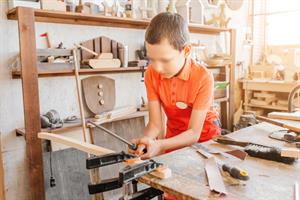
It seemed like Isaac was born with tools!
The neighbours looked at him with huge admiration when he produced things on his own. His grandmother was always praising him, and she never got tired of it. She had mentioned that he would be an excellent workman someday. She also said she did not doubt that Isaac would do well in his life and that he will become a rich man before he died.
Isaac seemed to love mathematics, apart from his mechanical skills. Hence, some of Isaac's friends told Isaac's grandmother to train him to become a clockmaker. He could apply his mathematical skills in the clock making profession. As time progressed, Isaac started making clocks for himself. He made strange clocks - some had a set of dancing figures which sprung out of the dial plate, every time the hour struck. He also made clocks where ships sailed across the face of the clock and showed the flowing up and down of the waves, whenever the pendulum vibrated.
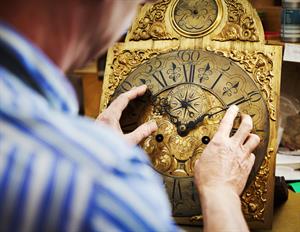
Clockmaking requires both mechanical & mathematical skills!
There were instances to believe that Isaac would dedicate his skills to make clocks - he had already manufactured a clock, which nobody had heard of. He made the clockwork by drops of water - it did not have wheels or weights like a normal clock. All his neighbours were amazed to see this object. There were some boys and some men who tried to tell the time, with the help of a bowl of water.
After the water-clock, he also made a sundial. A sundial is a device that tells the time of the day when there is sunlight, with the help of the shadow based on the position of the sun in the sky. When it was night time, his grandmother found the time with the help of water-clock, and during the day, with the sundial. The sundial made by Isaac can still be seen in Woolsthorpe, in a corner house, where he lived.
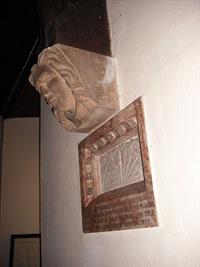
*Newton's sundial - can be seen today in Woolsthorpe, Lincolnshire.
Isaac had a great inbuilt mental power for getting knowledge from simple things. For example, do you know what method he adopted to find out the strength of the wind? He simply jumped against the wind - with the length of his jump, he calculated the force of the wind. He was able to differentiate between a gentle breeze, a very strong wind and a violent windy storm. Thus he used simple techniques like his everyday sports in searching for answers of great theories.

He jumped against the wind to calculate its force!
There was a windmill near Isaac's house, which operated on a new mechanism. Isaac had the habit of going there often, and he spent a long time studying the various parts. When the windmill was not operated, he meddled with its internal machine parts. When the sails of the mill were set going by the wind, he saw the process by which the attached stones started spinning and crushed the grain that was put into the hopper. Hoppers are funnel-shaped bins for feeding grains into the mills. Once he understood the specific mechanism of the windmill, it was seen that he was very busy with his tools - he started making one by himself!
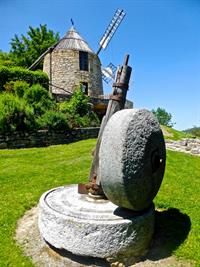
A grinding stone, which is usually placed inside a windmill - used for grinding flour!
Soon, his grandmother and the neighbourhood came to know why Isaac had been busy. He had constructed a model of the windmill that he had seen, all by himself. It was smaller than the original - only the size of trap boxes which boys made to catch squirrels. But every part was intact, and the set was complete. He made the sails out of linen which moved in rounds in a rapid speed when the windmill was exposed to air currents in a closed space. Even when Isaac blew a puff of air or used bellows, the sails started moving beautifully. (Bellow is a device with an airbag that emits a stream of air when squeezed together- usually used to kindle fire). Not only did the sails work perfectly, when he put a handful of grains, they were soon converted into pure white flour! The grinding stones had also been properly fixed, and the machinery he created was perfect.
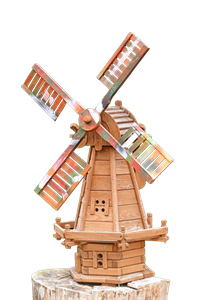
Isaac thought his model was complete and perfect!
Section - II
Isaac's friends were charmed with his new windmill. They felt they had not seen anything more wonderful or prettier than the windmill. But one of his friends pointed out that he had forgotten one thing that belonged to a mill. Isaac was surprised and asked what he had missed because he was sure that from the foundation to the roof of the mill, he had not forgotten any detail. His friend asked him where the miller was! Isaac agreed, he said he must search for one miller now and thought how the shortcoming could be overcome.
He could have easily made a small figure of a man to suit his model-sized windmill. But he would have to make it move about and make it do the duties of a miller. During Isaac's time, Gulliver's Travels, the famous book had not been written. Gulliver had not discovered the island of Lilliputs. Lilliputs are tiny people, about six inches tall - an imaginary character in the famous Gulliver's Travels. Such a small sized man would suit the model-sized windmill of Isaac. Isaac did not know it then. Isaac was wondering what to do for the miller. Just then, a mouse had been trapped in the mouse-trap set at Isaac's home. He appointed Mr. Mouse as the miller. The size of the mouse suited the size of the windmill. The new miller looked very respectable in his grey overcoat. But he was not a very honest miller, because he stole a portion of grain every time he was given grains to make flour! Maybe even two-legged millers (real millers - human beings) are sometimes as dishonest as these small four-legged animals.

Mr. Mouse - Not an honest miller!
As Isaac become older, he realized he had more important issues in his life than just making miniature toys of windmill and the miller. If he was alone, throughout the day, he was in deep thought or he deeply concentrated in some mathematics or natural philosophy book. During the nights, he looked up the sky and thought with deep respect to the stars, wondered whether the stars were worlds like our earth, what was the distance of stars from earth, what was the power that held them in their positions. Even in his young age, maybe he had an intuition that he should be able to answer the questions about our universe.
When Isaac reached 14 years, his mother's second husband died. She could not manage the farm in Woolsthorpe all alone, so she asked Isaac to assist her. So he had to discontinue his schooling. For one or two years, she tried to make Isaac concentrate on the farm, but he was very keen on becoming a specializing in his field of study. His mother sent him back to school, then to the University of Cambridge, one of the most prestigious universities.
He discovered the nature of light. Until then, nobody knew what sunshine was made of. All of us know the story of the apple falling on Newton's head, which made him discover the gravitational force, which held all the bodies in the universe, in its respective places. Once he had this idea, he was not able to stop thinking. He did not allow his mind to rest, and he searched all the laws governing the planets and the universe. He did a complete study as if he travelled to the stars and saw them travel in their paths. When he was young, he had discovered the techniques of a windmill; when he became older, he explained the structure of the universe.
When he was doing his studies, he had the habit of spending his nights in a tall tower, from where he saw the activities in the sky with the help of a telescope. His thinking was far ahead that the worldly things. He seemed to have spent more time in his life in studying about worlds which are millions of miles away from us. Ordinary, daily things were of no importance to him. He seemed to have truly existed millions of miles away from us because our true existence lies where our thoughts live.
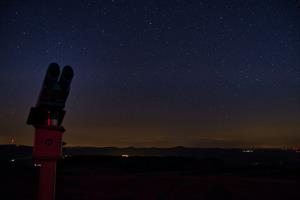
Gazing at the heavenly bodies through a telescope!
Newton lived till his old age. He was known as a famous thinker, he became the Member of the Parliament, and was honoured with "knighthood" from the king. In the UK, "knighthood" refers to a man awarded a non-hereditary title in recognition of merit and entitled to use the honorific ‘Sir’ in front of his name; He was known as Sir Isaac Newton after the "knighthood" was given to him, by the king. But he did not care about fame or honours, nor did he feel proud of his vast knowledge. The more he learnt, the more he realized how little he knew, when compared to what is yet to be discovered.
Isaac once told that he seemed like a child to himself. He said he was like a child playing on the sea-shores with shells and stones, while there was so much to discover about the endless sea in front of him.

"While the boundless ocean of truth lies undiscovered before me!"
Sir Isaac Newton died when he was aged 85, in the year 1727. The writer says he stopped himself from living on this earth. The writer says that he believed that Isaac Newton is still living somewhere searching for endless knowledge and the Creator (God) of the universe. He says Newton is sincerely looking for knowledge in his spirit form, with more success than when he was living in a body form. He has left behind huge fame for himself as if his name is written in a light, formed by the stars in the dark midnight sky.
Two characters, Mr. George and Mr. Temple, are in a discussion about Isaac. George said that he loved to hear about the clever mechanical devices that are made for specific purposes - like the small windmill and the water-clock. He further added that if Sir Newton had thought of steam-engines and railroads, he would have found those and other famous inventions also.
Mr. Temple agreed to Mr. George. He said many great people would have thought it was more useful to invent the steam-engines and railroads than to find about the universe, millions of miles away from us - as they are used in our day-to-day lives. There have been many great astronomers like Newton, who have been provided with great mechanical knowledge. For example, there was an American named Mr. David Rittenhouse, who made a small watermill when he was just seven or eight years old. But these type of inventions is very small, compared to their talents.
Reference:
*Image courtesy - https://commons.wikimedia.org/wiki/File:Newton_sundial_1.jpg
